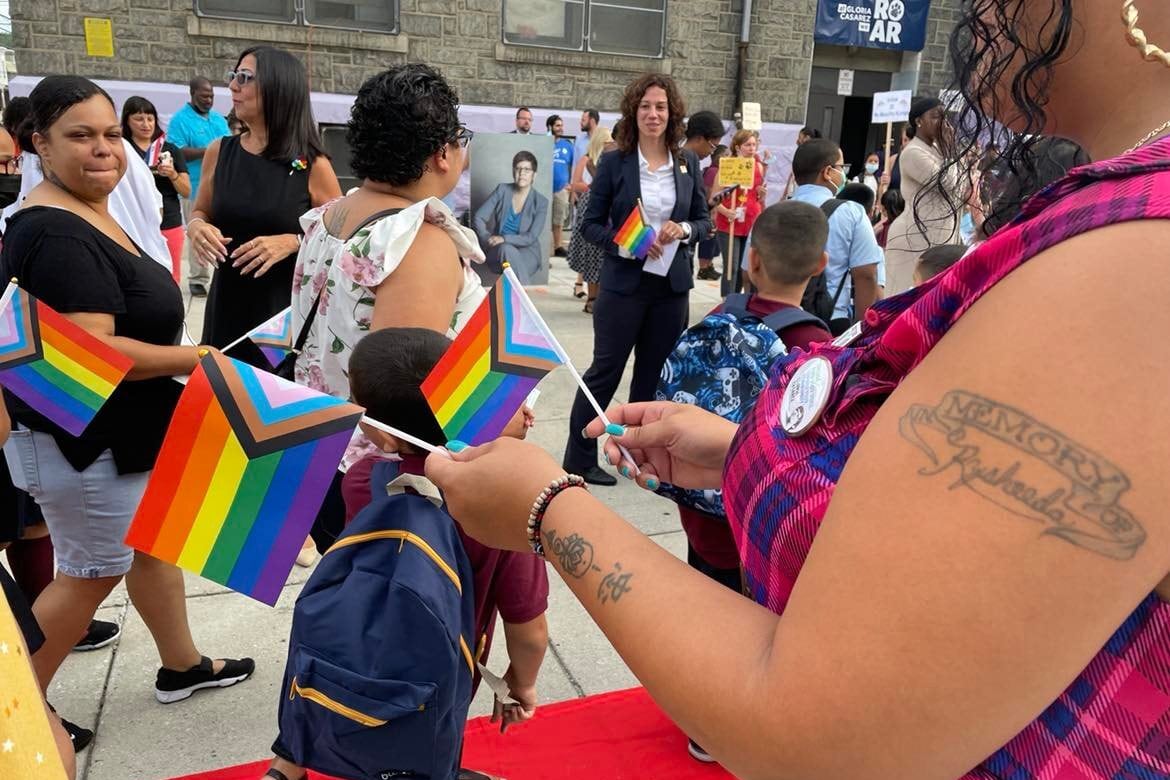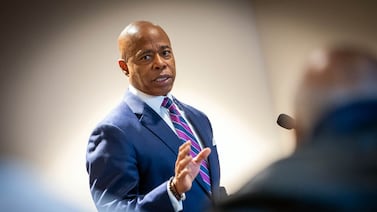Bryce was 14 when he came out to his father. He was 12 when he came out to his mother. But he was just 10 when he came out in elementary school.
“In school, being trans is very awful,” said Bryce, now 19. “It is horrible.”
But for him, he said, it would have been worse at home.
When he finally did come out, he said, his parents ridiculed him. His father refused to call him “son,” he said, and his stepmother locked him outside in a rage.
“They were very aggressive and immature and emotionally abusive,” said Bryce, who lives in a rural area in the Lower Peninsula. He asked Chalkbeat to withhold his last name and town out of fear for his safety.
Bryce said being able to be himself at school saved him. He would bind his chest with an Ace bandage every morning in the middle school locker room to hide the shape of his body beneath a loose hoodie.
“I don’t think I’d even be alive now, to be honest,” he said. “I’m very lucky to be here today.”
Now he worries about other trans schoolchildren in light of a controversy that erupted last week over teacher training around the care of LGBTQ+ students. The training, from the Michigan Department of Education, exposed a gap between teachers’ obligation to inform parents about potential mental health issues and their responsibility to shield children from potential harm.
The controversy emerged last Wednesday after conservative activist Christopher Rufo tweeted a 43-second video clip excerpted from a nine-hour professional development series offered by the MDE.
In the clip, which was later criticized by both Gov. Gretchen Whitmer and her Republican opponent, Tudor Dixon, a trainer suggests that teachers can talk with parents about a student expressing suicidal thoughts, without having to reveal that gender identity or sexual orientation is a cause of their distress.
Rufo tweeted that the clip proves MDE instructed teachers how to “facilitate” transgender students’ transitions and keep their chosen names and pronouns “secret from parents, even if the child is suicidal.” (Rufo is also one of the activists behind the conservative outcry over the teaching of critical race theory in America’s K-12 schools.)
The video, Rufo told Fox News last week, is an example of a way schools nationwide are radicalizing children, and he warned that parents need to be on guard.
MDE calls those accusations “patently false” and said the training helps schools create inclusive environments for vulnerable students who are more likely than classmates to be bullied and to attempt suicide. State superintendent Michael Rice has defended the training as important for teachers to better understand vulnerable students and help them feel safe and accepted in school.
Dixon, who has staked out conservative positions on a range of LGBTQ issues in schools, seized on the video Tuesday to call for Rice’s resignation. “Someone who has such contempt for parents as to instruct staff to hide information from them about their struggling child is unfit to oversee our education system,” she said at a press conference in Lansing, during which she criticized Whitmer for not taking a stronger stand.
Whitmer’s administration has itself raised concerns about the training. On Friday, the state’s chief operating officer, Tricia Foster, sent Rice a letter saying the training video goes outside the scope of his department’s responsibilities and asked him to ensure that trainings “comply with all applicable regulations, maintain department guidelines, and are reflective of best practices.”
Foster’s letter did not specify which regulations, guidelines, and practices she meant, and the governor’s office did not respond to questions.
The guidance in the video is consistent with MDE policy that has been in place since 2016, when the state board adopted guidance for schools around LGBTQ issues.
“The unique needs and concerns of each student should be addressed on a case-by-case basis, with a student-centered approach that includes the ongoing engagement” of the student, relevant school personnel, and parents “except in situations where educators are aware parental knowledge might threaten the student’s safety and/or welfare,” the policy says.
Whitmer campaign spokeswoman Maeve Coyle said that the governor “knows parents are crucial and should be involved in decisions about their children’s education” and that’s why she created the Michigan Parents Council to advise her.
Along with Dixon, the GOP-controlled Michigan Senate also condemned the professional development program in a resolution that passed on party lines. The resolution reaffirms “the fundamental right of parents to direct the education of their children.”
On Friday, the two Republicans on the eight-member state Board of Education also called for Rice’s resignation. Nikki Snyder of Dexter called the videos a “fundamental betrayal” and Tom McMillin of Oakland Township said they were evidence that “the assault on parents and parental rights has ramped up.”
Josh Cowen, a professor of education policy at Michigan State University, said the training could have been better but that conservatives are making political hay out of almost nothing.
“There is a silliness to this outrage by the right,” he said. “Some of this is just about scaring parents into thinking they have no agency or oversight of their children. We don’t live in that world.”
But he said MDE made missteps when it provided this training directly to teachers instead of guiding school districts to set up their own policies, ideally calling for consultations with trained mental health providers.
“My experience with MDE is that professional development they develop isn’t entirely based on evidence or rigor,” he said.
Rufo did not respond to requests for comment for this story.
For Bryce, school was the safest place to come out as transgender, and he wouldn’t have done so if he thought his teachers were obligated to tell his parents he had started using a different name and pronouns at school.
He wants it to be safe for other young people to be themselves at school, too.
“There are reasons why people don’t come out to parents, whether it’s safety or their parents aren’t going to accept them,” Bryce said. “I lost my family. That’s why I waited so long.”
He said he understands the view among conservatives like Rufo and Dixon that parents should direct their children’s education and that they need information to do that.
“We aren’t trying to silence the voices of our parents,” he said. “We just want to be in a safe and loving environment while we learn and grow as human beings.”
Siblings Cloud and Seassun Rosenfeld, who have a supportive family, said they didn’t have those kinds of worries for themselves when they came out — but they have friends who are frightened to tell parents they are struggling with gender identity issues.
“If there’s a policy that teachers have to or should tell parents, then kids who live in fear of their parents knowing wouldn’t tell anyone,” said Cloud, a seventh-grader in Ann Arbor who identifies as gender queer.
Cloud put their concerns bluntly: “If a teacher is obligated to tell that a child’s suicidal thoughts are around gender issues, that could result in the child actually committing suicide.”
Their father, Dave Rosenfeld, shares the concern.
“Not all LGBT kids, trans kids, get the support they need at home. That makes it even more important that they get the support they need at school,” he said. “LGBT kids who are not supported, who do not get the support they need, are at a massive risk of bad outcomes” such as running away, homelessness, drug addiction, suicide, and dropping out of school.
As a father, he understands the need for parents to be informed, but he said schools’ first obligation is to protect children from harm.
It’s a tough line for educators to walk, he acknowledged.
“Schools should work together with parents to educate the child, but if there’s any potential danger to the child, you have to respect the child’s choices,” he said. “Have some faith in the competence of children to know if it’s something they’re ready for their parents to know about.”
The uproar over the training videos demonstrates the need for more training around LGBT issues, not less, he said.
“The backlash against that type of professional development is born out of religious fanaticism,” he said. “I find it disgusting, because what they are advocating for … will really cause harm to kids who haven’t done anything wrong at all. All they want to do is get an education like all the other kids.”
Tracie Mauriello covers state education policy for Chalkbeat Detroit and Bridge Michigan. Reach her at tmauriello@chalkbeat.org.








